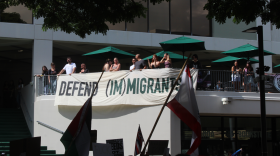Researchers from the University of Hawaiʻi and the John A. Burns School of Medicine hope to make an impact by studying health disparities impacting Native Hawaiians, Pacific Islanders and other ethnic groups.
They say it’s important to understand both the biological and social factors that affect the overall health of our diverse communities.
The medical school’s Ola HAWAIʻI was recently awarded the $22.5 million grant from the National Institutes of Health. Ola HAWAIʻI is a center at JABSOM that seeks to study and address health disparities in the islands.
The five-year grant funds three projects.
The first uses a backyard aquaponics program.
Native Hawaiians face the highest mortality rates of heart disease, diabetes and other related illnesses, while also struggling with accessing healthy food, researchers say. They hope to address these issues with the project.
“So we’re looking at holistic health from mountain to ocean, so ahupuaʻa living basically in your backyard,” said Ilima Ho-Lastimosa, a champion of using culturally-grounded aquaponics systems for many years. “We’re just trying to take the old thoughts and old perspectives and bring it back in a newer technology that still works for Hawaiian families. And it works.”
Ho-Lastimosa joins Jane Chung-Do, an associate professor with UH’s Office of Public Health Studies. They plan to work with 60 Native Hawaiian families from Waimānalo, Maui and Hilo.

The program will offer hands-on workshops and teach families to cook with vegetables, fruits and fish grown in the aquaponics system, as well as make Hawaiian medicine with the herbs they grow. Families can also grow food and herbs, such as māmaki, ōlena and ʻuala, that are not as easy to find at the grocery store.
Noemi Polgar and Nicholas James also hope to improve the health of Native Hawaiians, Pacific Islanders and other ethnic groups in the islands. Both work out of the medical school.
They plan to study how exercise may decrease the risk of developing type 2 diabetes. The illness disproportionately impacts Native Hawaiians and Pacific Islanders.
Polgar said exercise doesn’t seem to be as effective in reducing the risk of developing diabetes in NHPI populations as others, so they want to figure out why. She said they also want to identify exercise and lifestyle changes that resonate with NHPI communities.
“We know exercise is good for us. We want to know how is it good for us,” Polgar said. “And don’t think about exercise as going to work out in a gym, lift weights. Think about it as taking a walk, dancing hula, maybe working in your garden, all kinds of activities like that.”
The grant’s third project focuses on long COVID.
Dr. Gehan Devendra and Juwon Park plan to work with 200 people from different ethnic groups. That includes 100 people who have long COVID, as well as 50 who never had COVID and 50 who did but have since recovered.
They hope to better understand the causes of long COVID, as well as how social determinants can make people more prone to it. That includes the environment, chronic stress and racism.
“It’s a really good hybrid, looking at both basic science and the social science of where we’re going,” Devendra said. “Because we know that our biology is not just biology. We’re affected by things that happen to us on a daily basis.”
Park is an assistant professor at JABSOM, and Devendra is an intensive care doctor. Devendra said he hopes the study will help them to be more proactive in treating patients.
“I feel like I’m a person at the rock’s edge as people are going over, trying to get them before they get into trouble. But I’m helping one person,” Devendra said. “If we take that analogy further, how about community groups, governmental organizations, policymakers… they’re much more upstream. So how can our data influence upstream.”





